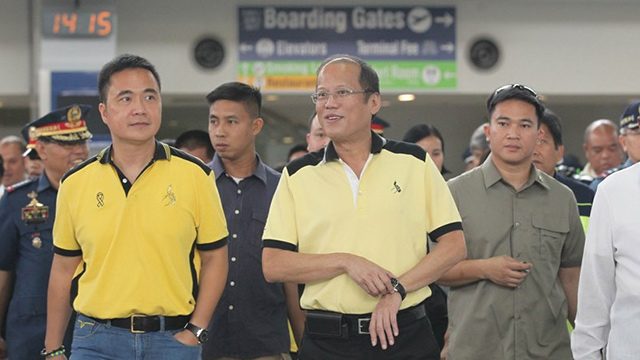SUMMARY
This is AI generated summarization, which may have errors. For context, always refer to the full article.

MANILA, Philippines – Transportation Secretary Joseph Emilio Abaya is insisting that the integration of terminal fees in airfares in the Ninoy Aquino International Airport (NAIA) is for the interest of passengers.
Since February 1, international passengers to and from the NAIA started paying terminal fees in their online plane tickets, despite strong opposition from migrant workers’ groups.
In a chance interview Monday, February 2, Abaya said the scheme is meant “to make the passenger experience at NAIA better.”
“In other countries, you don’t pay terminal fees because the system is, as a good practice, the terminal fees are included in the airfare,” Abaya explained in Filipino.
He said the Philippines is among the few countries lagging behind in enforcing this system, echoing an argument by the Manila International Airport Authority (MIAA) that the terminal fee integration is meant to ease congestion in NAIA.
“This began because we wanted to lessen the lines in terminals, because we want traveling to be efficient, for swift arrival and departure,” he said further in Filipino.
NAIA is notorious for traveler complaints and had been cited as being among the world’s worst airports.
READ RELATED ARTICLES:
Opposition
Overseas Filipino Worker (OFW) Family party-list Representaive Roy Señeres had pointed out the findings of a House committee that congestion in NAIA is not at the travel tax and terminal fee counters but at the airline check-in, baggage check, and immigration counters.
These observations were unanimously adopted by the House committee on overseas workers affairs (COWA), whose members likewise conducted an ocular inspection of NAIA in late 2014.
Señeres, a former labor attaché at the Philippine Embassy in Washington, DC, leads pro-OFW groups petitioning against the terminal fee integration before a Pasay court.
Petitioners had argued that MIAA’s plan of reimbursing the P550 terminal fee of an OFW who bought his or her ticket online or abroad violates the OFWs’ law-mandated exemption from terminal fee payment.
The campaign, dubbed #NoTo550, has gained support from the Catholic Church and the recruitment industry, after the MIAA proceeded with the integration without first informing the court hearing the case.
Only 200,000 OFWs affected
Citing MIAA data, Abaya said only 200,000 OFWs would be affected by the new policy.
He said there are 6 million Filipino passengers bound overseas from the NAIA in a year, two million of whom are OFWs.
The reimbursement mechanism will only affect OFWs who buy their tickets online and abroad, and the P550 fee will be refunded upon their arrival at the airport, he said.
On February 1, the first day of implementation, Abaya said there was one OFW who sought a refund.
Petitioning pro-OFW groups had said OFWs who have more pressing concerns upon arrival or departure will likely no longer line up for the refund.
Señeres had questioned where the bank interest from deposited terminal fees pending refund, or those not refunded at all, will go to. – Rappler.com
Add a comment
How does this make you feel?
There are no comments yet. Add your comment to start the conversation.